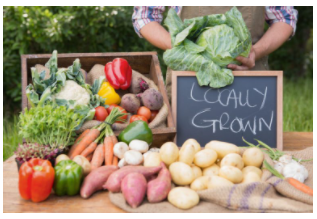Think local

Photo Courtesy of HueTrition
A message some of us may hear a lot is, “Buy Local!” But what does this mean? Essentially, a locally owned business is a business that is owned and operated by a member of one’s community. On the other hand, a national company is owned and operated by a large corporation, often with hundreds of locations nationally and internationally. Larger businesses often have the tendency to drive local markets and stores out of business. In order to prevent this from happening, there needs to be a bigger cash flow throughout the community in order to keep small businesses from failing. Buying local means we are choosing to buy products from farmers and businesses that are close to where we live, which helps create a successful and flourishing community.
There are many environmental benefits to buying local. The most beneficial factor is that it helps support our community directly. Supporting local farmers helps maintain farmland and keeps open space available in the community. A great example of support is a local farmer’s market, where locally grown food is distributed. Choosing to buy from local farms gives us the chance to talk about where and how our food was grown and harvested. In doing this, we are more connected with our community. Environmental benefits also include better community health, promotion of local wealth (money that locally owned businesses receive is often cycled back into the community), reduction of the use of fossil fuels, and more efficient economic use of land. Another important benefit includes guaranteed safety of the products, meaning that it is easier to confirm that the food is indeed fresh and harvested safely. However, where there are pros, there are also cons.
There are some disadvantages to buying local. Some of the biggest ones include higher costs and less variety. Local farmers and businesses typically produce goods in smaller numbers, so they charge more money. A lot of money is put in to grow fresh crops because of the higher quality materials that are used, which is why they need to keep higher costs to get that money back. There is not a wide variety in food when buying locally because all the fruit and vegetables are freshly harvested, and they only sell in-season produce, whereas grocery stores ship and freeze their produce all over the world, so they have a wider variety. If everyone started to buy local foods, there is some produce that could potentially sell out, which means that it may no longer be available during certain seasons. This would lessen the variety of produce in local farms even more. Nevertheless, the benefits definitely outweigh these cons, meaning that buying locally is more good than bad.
Additionally, locally owned businesses create communities that are more prosperous and connected. This ultimately strengthens the base of our whole community, according to the Sustainable Connections Website.
“Try adopting a less is more attitude towards consuming and prepare the majority of your meals at home”, said Jodie, a blogger from Simple Minded.
Small, local changes have the potential to add up to make big, global changes. Buying locally grown products is primarily a better move for improving our economy and, most importantly, our health.
If you want to learn more about buying local, go to: https://www.buylocalfood.org/buy-local/










